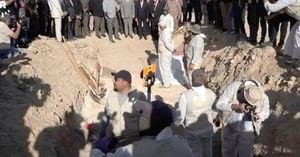On a seemingly ordinary Friday evening off Ecuador’s El Oro coast, horror struck as about 60 armed gunmen descended upon a boat, unleashing a barrage of bullets and explosives on its unsuspecting occupants. The attack, which took place on August 8, 2025, has left at least four people dead and more than a dozen missing, according to witness accounts reported by Extra, a local newspaper. The incident has sent shockwaves through a nation already reeling from a surge in violent crime and has underscored the mounting challenges faced by President Daniel Noboa’s administration.
The details of the attack, pieced together from local reporting and an official from Ecuador’s navy who spoke to the Associated Press on condition of anonymity, paint a harrowing picture. The gunmen, operating with chilling coordination, approached the boat in the troubled region of El Oro—an area that has become synonymous with violence and instability in recent years. Witnesses described how the assailants opened fire indiscriminately and launched explosives at the vessel, leaving chaos and devastation in their wake.
"It was like something out of a nightmare," one witness told Extra, reflecting the palpable fear and confusion that gripped those present. The attack was so sudden and overwhelming that escape was nearly impossible for many on board. At least two victims have been identified, though authorities have yet to release their names or provide further details about the missing.
The aftermath of the assault saw a dramatic pursuit on the water. According to the navy official, the suspects attempted to flee the scene aboard three separate boats. The Ecuadorian coast guard, responding swiftly, managed to block their escape. However, one of the boats managed to evade capture, while the occupants of the other two vessels abandoned ship, plunging into the water and disappearing into the dense mangroves that line the coast. No suspects were apprehended, but munitions were found aboard the two abandoned boats—a stark reminder of the firepower wielded by the attackers.
As of Saturday evening, Ecuadorian authorities had yet to issue an official comment on the attack. The silence from officials has only fueled speculation and anxiety among residents of El Oro and beyond, who are no strangers to violence but were nonetheless shaken by the scale and brazenness of this latest incident.
The timing of the attack could hardly be more significant. It occurred less than 48 hours after the Ecuadorian government declared a two-month state of emergency in El Oro province, a desperate measure taken in response to a dramatic uptick in violent crime. The state of emergency, which grants security forces expanded powers and restricts certain civil liberties, was intended as a show of force against criminal organizations that have increasingly made the region their battleground.
President Daniel Noboa, who secured re-election in May 2025, has made tackling drug trafficking and violent crime a central pillar of his administration. In public statements, he has repeatedly vowed to restore order and ensure the safety of Ecuador’s citizens. "We will not allow criminal groups to terrorize our people or undermine the rule of law," Noboa declared in a recent address. Yet, as the events of August 8 starkly illustrate, the challenge is formidable and the path forward uncertain.
The broader context of this violence is sobering. Ecuador, a country of approximately 18 million people, has seen a dramatic escalation in killings over the past several years. According to official data cited by Associated Press, the nation recorded a staggering 8,000 homicides in 2023—a record high that shocked even seasoned observers of the region’s criminal landscape. While the number of killings dipped slightly to nearly 7,000 in 2024, the first half of 2025 has already seen 4,619 reported murders, signaling that the downward trend may have been short-lived.
The roots of Ecuador’s security crisis are complex and multifaceted. Once considered one of the safer countries in South America, Ecuador has in recent years become a key transit point for drug trafficking organizations moving cocaine from neighboring Colombia and Peru to markets in North America and Europe. This strategic importance has drawn powerful criminal groups into the country, fueling turf wars, extortion rackets, and a general climate of lawlessness in regions like El Oro.
The government’s response has been robust but, so far, not decisive. The state of emergency in El Oro is just the latest in a series of extraordinary security measures enacted over the past two years. These include increased military patrols, expanded police powers, and the deployment of specialized anti-narcotics units. Yet, as Friday’s attack demonstrates, criminal organizations remain both well-armed and emboldened, capable of mounting large-scale operations even in the face of heightened security.
The human toll of this violence is impossible to ignore. Families in El Oro and across Ecuador live in a state of constant anxiety, unsure when or where the next attack might occur. Local media have reported on the psychological strain endured by residents, many of whom have lost loved ones or been forced to flee their homes in search of safety. The sense of vulnerability is particularly acute in coastal regions, where the reach of the state is often weakest and criminal groups hold sway.
Community leaders and civil society organizations have called for a more comprehensive approach to the crisis, one that goes beyond security crackdowns to address the underlying social and economic drivers of crime. "We need jobs, education, and hope for our young people," one activist told Extra. "Otherwise, the cycle of violence will never end."
International observers are also watching closely. Ecuador’s transformation from a relatively peaceful nation into one of the region’s most violent has alarmed neighboring countries and prompted offers of assistance from foreign governments and organizations. The United Nations and the Organization of American States have both urged Ecuador to uphold human rights as it confronts the threat posed by organized crime, warning that heavy-handed tactics could backfire and deepen the crisis.
For now, the people of El Oro are left to mourn their dead and search for the missing, even as they brace for the possibility of further attacks. The government’s ability to restore order and deliver justice to the victims will be a critical test—not only for President Noboa’s leadership but for the resilience of Ecuadorian society itself.
As the investigation continues and the search for suspects intensifies, one thing is clear: the events of August 8 have marked a dark chapter in Ecuador’s ongoing struggle with violence, and the path to peace remains fraught with uncertainty.





